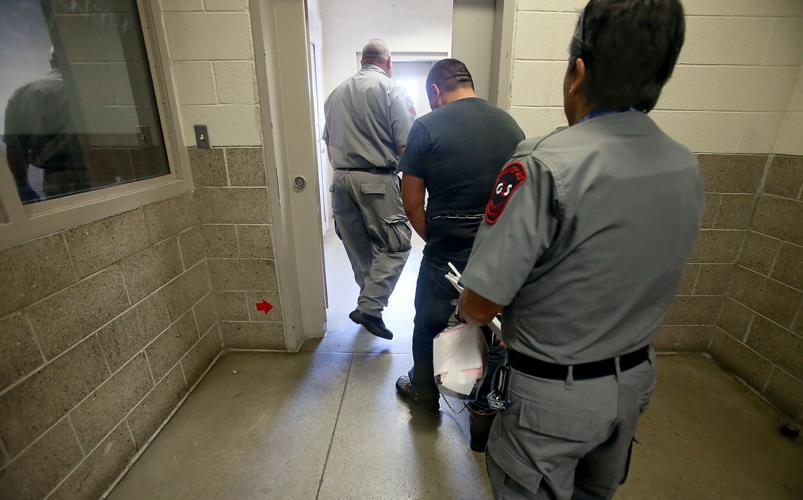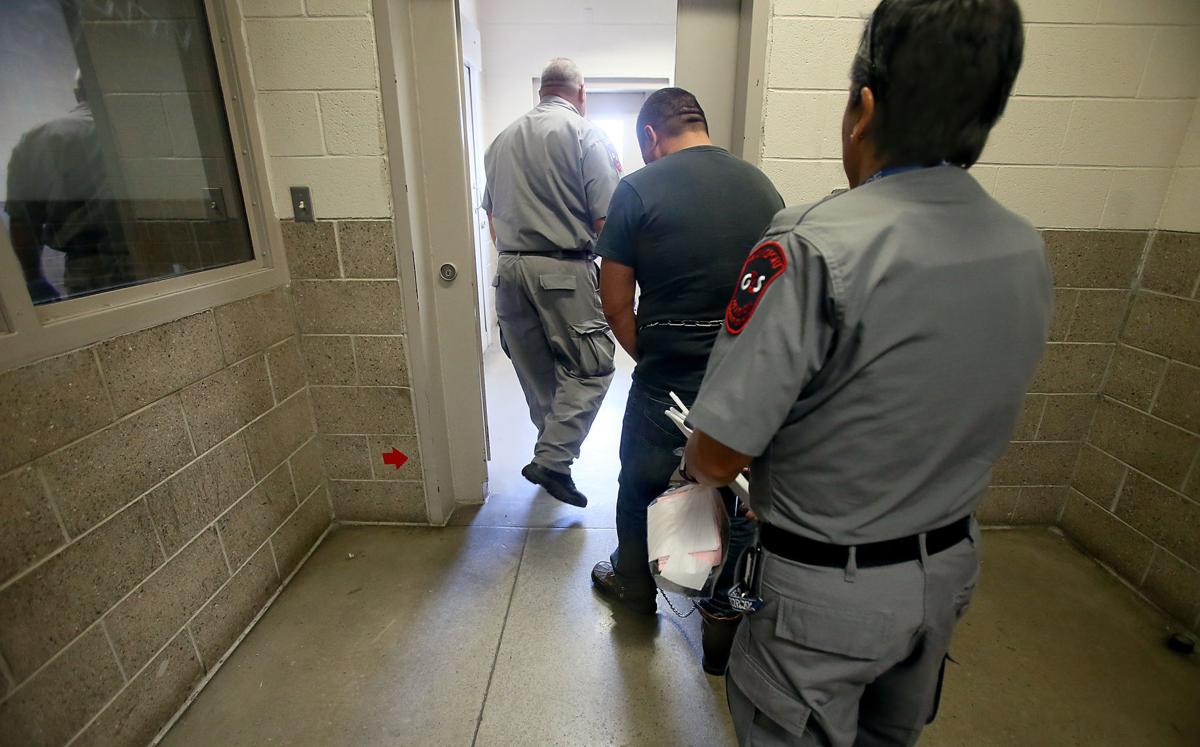More than 400 Pima County employees will face termination if they fail to get vaccinated by Dec. 31.
The Board of Supervisors voted in October to approve a COVID-19 vaccine mandate for employees who primarily work with vulnerable populations confined in a detention facility or nursing home or who provide direct services to children or the elderly.
That definition applies to 2,154 county employees of which 405 have yet to confirm their vaccination status, according to county data.
The guidelines of the mandate laid out in a memo from Chief Deputy County Administrator Jan Lesher, who is filling in for County Administrator Chuck Huckelberry as he recovers from a bicycle accident, show that no unvaccinated employee will be able to work with the county’s definition of vulnerable populations, regardless of exemptions granted.
At the board’s Dec. 7 meeting, supervisors will be asked to approve a plan to send out notices of intent to terminate by Dec. 20 with final notices to be issued by the Dec. 31 deadline.
“Not only are we an employer, but we’re the public health entity for the county and need to make sure that we’re modeling that behavior, particularly with those of our employees who work with populations who may not have a choice to be in contact with our employee or not,” Lesher said.
Of the 11 departments with employees subject to the mandate, the Sheriff’s Department has the highest count at 550, with 225 employees yet to be vaccinated, county data show. All of those employees work in the county jail, according to Sheriff Chris Nanos.
The behavioral health department, with 11 employees subject to the mandate, is the only department with a 100% vaccination rate. There are 57 employees in the parks and recreation department who have yet to verify their vaccination status, along with 51 in the county’s libraries.
The majority of the 405 subject employees are merit-protected, meaning there’s a standardized process for their termination. Those employees who remain unvaccinated by the end of the year will be served with a notice of intent for involuntary termination then have a meeting with their department’s representative to make their case.
If the county determines the termination decision still stands, employees will be served will a final notice of their termination.
So far, 53 unclassified employees without merit protection could be served with a set date of their termination with no appeal process.
“Our rules that govern rights and responsibilities for personnel in the county just differentiate those two groups as who needs what kind of pre-action. Unclassified employees are absolutely at will, so you can certainly just let people go at will there,” Lesher said. “There’s no formal process required, and the termination can be effective on that date.”
Religious beliefs
The city of Tucson enacted a vaccine mandate for all its employees with a Dec. 1 cutoff date to comply or face termination. While nearly all city employees were considered in compliance, 10% of them were granted religious or medical exemptions and remained unvaccinated.
The county is also accepting medical exemptions and religious accommodations based on “sincerely held religious beliefs” for those objecting vaccines. So far, the county’s received 57 of both types of requests from employees subject to the mandate.
But the county is not allowing employees granted exemptions to continue working with vulnerable populations. Instead, these employees can be reappointed to a new county position, but the onus is on them to find a new one within 30 days.
Those employees must seek out a different county job where they meet the minimum qualifications, would make the same or a lower salary than their current positions and the department head agrees to the reappointment.
“That’s going to be difficult when you look at the categories where we have employed the most employees,” Lesher said. “Someone who’s a corrections officer, someone who’s doing public defense services working with people in the jail, they may find that other opportunities are limited.”
‘Tough decision’
As the head of the department with the most potential terminations from the vaccine mandate, Nanos said the board’s move is “the right thing to do” and believes he can handle any resulting staffing issues.
Pima County Sheriff Chris Nanos said he supports the county vaccine mandate for employees who work with vulnerable people, including jail inmates.
“I know that it does add challenges to the workforce. But I just hope these young men and women that we have — who are good employees, or they wouldn’t be there — I hope they choose wisely,” Nanos said. “I understand it’s a tough decision for them to make, but my decision in supporting this was also equally as tough.”
After an inmate died after testing positive for COVID-19 in the jail in September, Nanos pointed to unvaccinated corrections officers as a possible vessel of transmission as some of the only entities to enter the cells of quarantined inmates.
“After we’d lost the last person to COVID, somebody asked me, ‘Are you doing all you can to keep those people safe in that facility?’ To be honest, I couldn’t answer yes, because we weren’t mandating vaccines,” he said.
Lesher said the county is working with Nanos and other department heads to address a potential gap in the workforce the vaccine mandate could cause.
Some ideas, she said, include improving probation services to dwindle the jail’s population in attempts to minimize the impact of a loss of corrections officers.
“We have already started convening a working group ... so that we can all come together and have conversations about what it is we need to do,” Lesher said. “If we can get folks out of the jail because of probation opportunities, or they’re people that don’t need to go immediately into jail, how do we accommodate that so that we can get the jail population down in order to deal with fewer corrections officers?”
The Board of Supervisors will give the final say on the vaccine mandate on Dec. 7 and could reject or modify the rules laid out by county administration.
Supervisor Rex Scott, who initially opposed a vaccine mandate for all county employees, said he supports the version that limits the mandate to certain workers.
“I initially said that I did not want to look at suspension or termination as an option. But when we directed (the county administrator) to come back to us with a plan to encourage vaccinations, that was the first time that somebody had introduced to us the concept of vulnerable populations,” he said. “That caused me to think really deeply about what it meant to be one of those people in one of those populations.”







